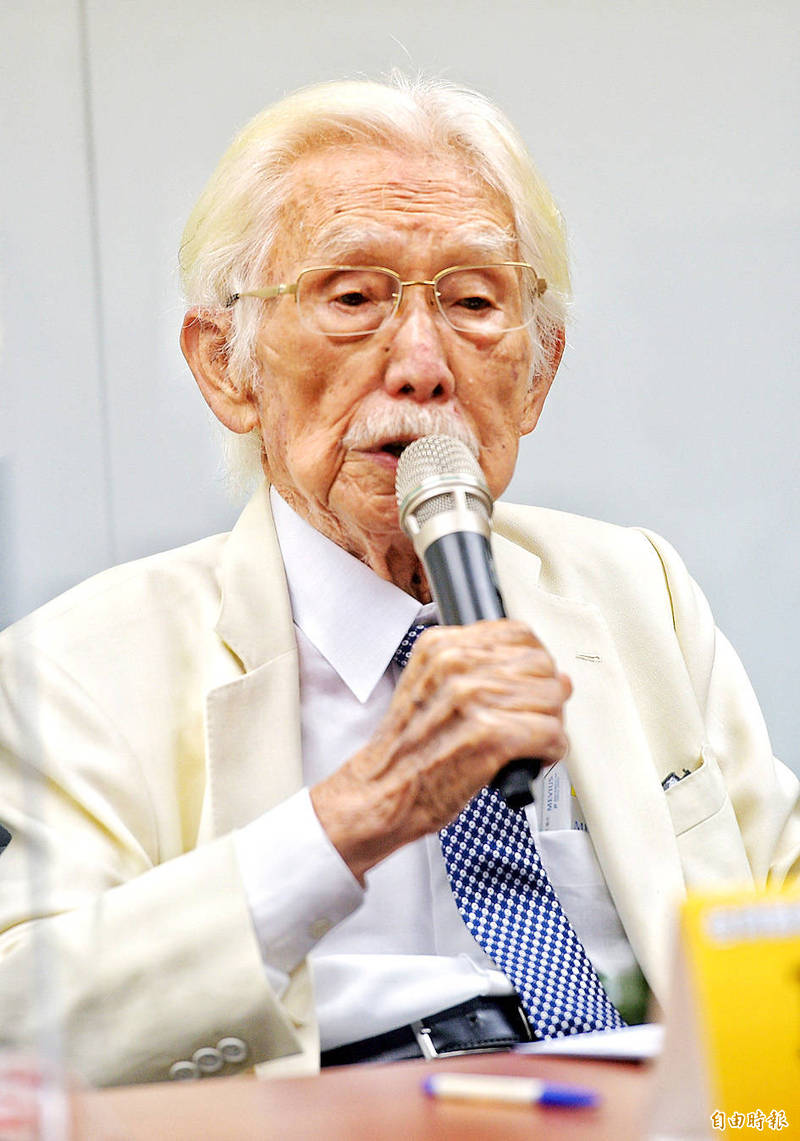《TAIPEI TIMES》 Independence advocate Koo Kwang-ming dies

Taiwanese independence advocate Koo Kwang-ming is pictured in Taipei on Aug. 10, 2021. Photo: Chang Chia-ming, Taipei Times
REMEMBERING A PIONEER: Taiwanese are fortunate to follow in Koo’s footsteps on the path toward becoming a recognized independent country, You Si-kun said
By Chen Yu-fu and Kayleigh Madjar / Staff reporter, with staff writer and CNA
Taiwanese independence advocate and former presidential adviser Koo Kwang-ming (辜寬敏) passed away yesterday. He was 96.
Koo died surrounded by family at 8:55am yesterday at Taipei Veterans General Hospital, said a statement by the Taiwan New Constitution Foundation, founded by Koo.
It did not specify a cause of death.
Plans for a public memorial service would be announced at a later date, it said.
Koo was born in Taipei in 1926 to a prominent family from Changhua County’s Lukang Township (鹿港). In 1947, he enrolled in the political science department of National Taiwan University (NTU).
He left Taiwan after a police crackdown on a student protest in 1949. Police had stopped and beaten a group of NTU and Taiwan Provincial College (now National Taiwan Normal University) students, leading to protests outside a local police station.
Later that year, the authorities raided two school dormitories to arrest the suspected leaders of the protest. Koo, who was in Hong Kong at the time of the raids, received word that the police had come to his home looking for him, and was urged by family members not to return to Taiwan.
He and his first wife settled in Japan, where he lived for more than two decades, while funding political activists and helping to found the Japan branch of the World United Formosans for Independence.
In 1972, Koo was invited to Taiwan for a secret meeting with then-premier Chiang Ching-kuo (蔣經國), during which Koo urged the government to allow space for local opposition parties and to abandon its “delusional dream” of retaking China, he later said.
Koo returned to live in Taiwan in 1975, later saying that “the key issue in the independence movement is not promoting it internationally, but in Taiwan itself.”
He founded and ran a large fishing company, while continuing his political activism.
He said it was his hope that one day Taiwan would be considered an independent, normalized and dignified nation of immigrants like Australia, Canada, New Zealand, the US and countries in South America.
In 2009, he established the Taiwan Rescue Action Alliance and started a 319-township citizen action lecture tour. The next year, he founded the Taiwan Brain Trust think tank, followed by the New Taiwan Peace Foundation in 2013.
In 2019, he founded the Taiwan New Constitution Foundation, and the year after launched the nation’s first referendum to amend the Constitution. In 2021, he brought together more than 100 organizations to form the Taiwan New Constitution Alliance with the goal of amending the Constitution.
Koo also met former Japanese prime minister Shinzo Abe.
He said that he told Abe that Taiwan-Japan relations are inextricably linked, which some saw as an indirect precursor to Abe saying “a Taiwan emergency is a Japan emergency.”
Koo believed that Taiwan’s colonial history is tragic, but because of this, “we cannot repeat the past,” the Taiwan New Constitution Foundation said yesterday.
Most Taiwanese consider Taiwan to be an independent, sovereign nation, but it still bears an “abnormal” status, partly because it has a constitution that considers China and Taiwan to be one country, it said.
Koo was committed to forming a new constitution drafted by and for the people of Taiwan, it added.
In the early 2000s, Koo, a member of the Democratic Progressive Party (DPP), was as an adviser to then-president Chen Shui-bian (陳水扁), and later to President Tsai Ing-wen (蔡英文).
News of Koo’s death was met with an outpouring of tributes from DPP figures.
In a statement issued by the Presidential Office, Tsai offered condolences to Koo’s family and expressed gratitude for his lifelong efforts to defend Taiwan’s sovereignty, and promote free and democratic values, and his contributions to Taiwan’s localization movement.
Writing on Facebook, Vice President William Lai (賴清德) called Koo’s passing “a loss for the nation,” and pledged to continue protecting Taiwan’s democracy, peace and prosperity in his honor.
Also on Facebook, Legislative Speaker You Si-kun (游錫?) said that “we are fortunate to be able to follow in Mr Koo’s footsteps” on Taiwan’s path toward becoming a recognized independent country, adding that “we shall continue with diligent efforts toward this goal.”
Premier Chen Chien-jen (陳建仁) said that “Koo’s moral conviction and gentleman spirit, as well as his strength of character will always remain within the hearts of Taiwanese.”
DPP legislative caucus convener Ker Chien-ming (柯建銘) in a message titled “Salute to the Eternal Taiwan Independence Warrior” wrote that “for those he left behind, we must contemplate on how to pick up the torch of those who came before us.”
The New Power Party said in a statement that Koo spent his life seeking normalization of Taiwan as a nation.
Toward that goal, the party would strive to change the Constitution and the country’s name in the hopes of restoring a sense of identity and belonging in Taiwan, it said.
“Koo is an elder statesman of Taiwan’s democracy movement, who vigorously supported Taiwanese independence and gave great support to organizations pushing for independent nationhood,” Taiwan Republic Campaign chairman Chou Chung-teh (周崇德) said.
Japan-Taiwan Exchange Association Representative Hiroyasu Izumi also issued a statement commemorating Koo.
When Taiwan and Japan broke diplomatic relations, Koo played the role of a secret envoy between Tokyo and Taipei “in the hopes of maintaining practical relations,” he said.
Afterward, Koo spent many years promoting friendly relations between the countries, he added.
Koo’s passing “feels like losing another important compass along a voyage,” he said, adding that he wished to express his “deepest gratitude and condolences.”
Additional reporting by Chen Yun, Lu Yi-hsuan and Jason Pan
新聞來源:TAIPEI TIMES
















